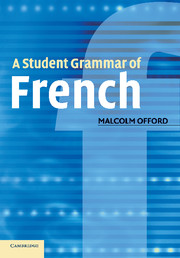Book contents
- Frontmatter
- Contents
- Acknowledgements
- Introduction
- Chapter 1 Verbs: 1
- Chapter 2 Verbs: 2
- Chapter 3 Tabular treament of verbs
- Chapter 4 Verb list
- Chapter 5 Nouns and adjectives
- Chapter 6 Pronouns
- Chapter 7 Determiners
- Chapter 8 Prepositions
- Chapter 9 Adverbs and adverbial expressions
- Chapter 10 Negation
- Chapter 11 Numerals
- Chapter 12 Sentences and clauses
- Key to exercises
- Bibliography
- Index
Chapter 5 - Nouns and adjectives
Published online by Cambridge University Press: 05 June 2012
- Frontmatter
- Contents
- Acknowledgements
- Introduction
- Chapter 1 Verbs: 1
- Chapter 2 Verbs: 2
- Chapter 3 Tabular treament of verbs
- Chapter 4 Verb list
- Chapter 5 Nouns and adjectives
- Chapter 6 Pronouns
- Chapter 7 Determiners
- Chapter 8 Prepositions
- Chapter 9 Adverbs and adverbial expressions
- Chapter 10 Negation
- Chapter 11 Numerals
- Chapter 12 Sentences and clauses
- Key to exercises
- Bibliography
- Index
Summary
Nouns
Nouns
As has been seen, the verb is the pivotal element of the sentence (see 2) – indeed a sentence may consist entirely of a verb (viens! = come on!, écoute! = listen!) or a verb and subject pronoun (je viens = I'm coming, j'écoute = I'm listening); see 453. But very often the verb is accompanied by one or more nouns, or a noun and an adjective or two, and this adds more information and detail to the sentence.
Nouns in French have very much the same characteristics as nouns in English and may be used in very much the same ways. What follows is a brief résumé of their major general characteristics and uses.
Nouns are words which are preceded by a determiner – such as the definite or indefinite article, demonstrative or possessive adjective – and/or an adjective, and may be followed by an adjective and/or an adjectival phrase or clause (see 178, 247–272) –
definite article – le succès = success, le secret de la coloration = the secret of colouring
indefinite article – une fois = once, un geste simple = a simple gesture
demonstrative adjective – ce cocktail que je viens de préparer = this cocktail that I've just prepared
possessive adjective – votre propriétaire = your landlord, ses réactions = her reactions
The noun may refer to concrete and abstract items – to people, objects, places, ideas.
- Type
- Chapter
- Information
- A Student Grammar of French , pp. 129 - 160Publisher: Cambridge University PressPrint publication year: 2006



